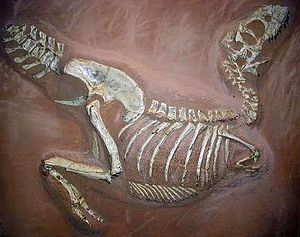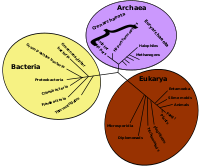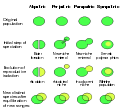Portal:Evolutionary biology
Introduction
Selected article -Speciation is the evolutionary process by which populations evolve to become distinct species. The biologist Orator F. Cook coined the term in 1906 for cladogenesis, the splitting of lineages, as opposed to anagenesis, phyletic evolution within lineages. Charles Darwin was the first to describe the role of natural selection in speciation in his 1859 book On the Origin of Species. He also identified sexual selection as a likely mechanism, but found it problematic. There are four geographic modes of speciation in nature, based on the extent to which speciating populations are isolated from one another: allopatric, peripatric, parapatric, and sympatric. Whether genetic drift is a minor or major contributor to speciation is the subject of much ongoing discussion. (Full article...)General images -The following are images from various evolutionary biology-related articles on Wikipedia.
Selected picture - Tarbosaurus at the Naturkundemuseum Münster in Münster, Germany. Did you know... -
CategoriesRelated portalsTasks you can do
Related topicsWikiProjectsWikiProjects connected with biology: A complete list of scientific WikiProjects can be found here. See also Wikispecies, a Wikimedia project dedicated to classification of biological species. Associated WikimediaDiscover Wikipedia using portals |














![Image 14A covalent adduct between the metabolite of benzo[a]pyrene, the major mutagen in tobacco smoke, and DNA (from Mutation)](http://upload.wikimedia.org/wikipedia/commons/thumb/d/d8/Benzopyrene_DNA_adduct_1JDG.png/87px-Benzopyrene_DNA_adduct_1JDG.png)


































